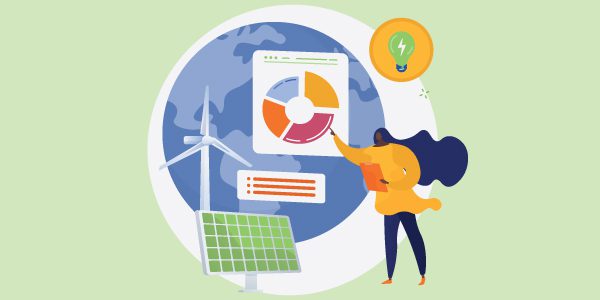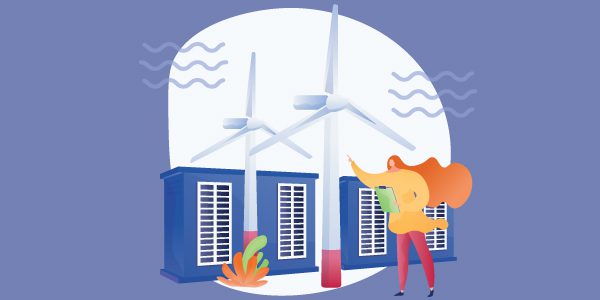US corporate clean energy buying grew 18% in 2020, despite global adversity.
Despite a year devastated by the Covid-19 pandemic, a global recession and uncertainty about U.S. energy policies ahead of the 2020 presidential election, US Corporations purchased a record of 23.7GW of clean energy in 2020, up from 20.1GW in 2019 and 13.6GW in 2018.
Furthermore, BNEF found in its 1H 2021 Corporate Energy Market Outlook that more than 130 companies in sectors ranging from oil & gas to big tech have signed cleaned energy contracts.
This instant surge in markets indicates a growing interest in corporate sustainability, as well as a will to expand access to clean energy globally. Implementing sustainability strategies across operations, even during uncertain times, is a testament to how high sustainability is on many corporations’ agendas.
The first half of 2020, coinciding with the start of the pandemic, U.S. companies were particularly subdued. Many U.S. companies announced 11.9GW of corporate PPAs (in 2020), down from 14.1GW in 2019 – the first year-on-year drop since 2016.
Corporate Procurement Markets Are Stepping Up
While the U.S. and Latin America slipped back, other corporate procurement markets stepped up. Corporate PPA volumes in the Europe, Middle East and Africa (EMEA) region nearly tripled, from 2.6GW in 2019 to a record 7.2GW in 2020.
In Spain in particular, companies announced contracts to purchase no less than 4.2GW of clean energy, up from 300MW the previous year. Solar and wind projects in Spain boasted some of the cheapest and most competitive prices in Europe – thanks to their strong natural resources and a large pool of experienced developers.
At the same time, companies like Total and Anheuser Busch are orchestrating ‘cross-border virtual PPAs’ in Spain, buying clean energy in the country to offset their load elsewhere in Europe.
Corporations also purchased record clean energy volumes in the Asia Pacific (APAC) region, announcing contracts for 2.9GW of solar and wind. Taiwan also established itself as a major corporate clean energy market in 2020, with companies signing PPAs, totaling 1.25GW.
Many of Taiwan’s large manufacturers are getting pressure from their customers to decarbonize. Thus, the market is likely to grow and should be supported by a new policy that requires companies with an annual load above 5MW to buy clean power.
As Jonas Rooze, lead sustainability analyst at BNEF said: “More than ever before, corporations have access to affordable clean energy at a global scale. Companies no longer have an excuse for falling behind on setting and working towards a clean energy target.”
A Scope For Markets To Grow
Amazon stands as the world’s largest corporate purchaser of clean energy in 2020. As of December 2020, Amazon announced 26 new utility-scale wind & solar energy projects, bringing its total investment in renewables to 35 projects. Advancing its climate pledge commitment to be net-zero carbon by 2040.
The company has now purchased over 7.5GW of clean energy to date, vaulting it ahead of Google (6.6GW) and Facebook (5.9GW) as the world’s largest clean energy buyer. Following their lead, French oil major Total (3GW), TSMC (1.2GW) and U.S. telecom Verizon (1GW) were the next largest corporate buyers of clean energy in 2020.
There’s a huge scope for the markets to grow, and with more companies engaging in the clean energy commitment, is the proof of it. About 65 new companies joined the RE100 in 2020, pledging to offset 100% of their electricity consumption with clean energy.
According to BNEF the 285 RE100 members will collectively need to purchase an additional 269TWh of clean electricity in 2030 to meet their RE100 goals. Should this shortfall be met exclusively with offsite PPAs, it would catalyze an estimated 93GW of new, incremental solar and wind build.
As Kyle Harrison (BNEF senior associate) said, “Investor interest in sustainability is sky high, with inflows to sustainability-focused funds growing 300% between 2019 and 2020”.
He further added, “Companies in all sectors, including hard-to-abate ones like oil & gas and mining, are feeling the pressure to purchase clean energy and decarbonize. This group is just realizing the amount of clean energy build it can catalyze.”
By the end of 2021, we are likely to see even more corporations include a clean energy strategy in their sustainability agenda towards net-zero carbon.
And at Anávo, we are committed to working with industries across all energy sectors by helping place the best talent to enable this global transition.












